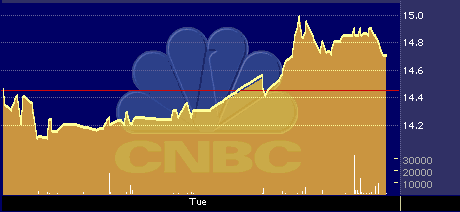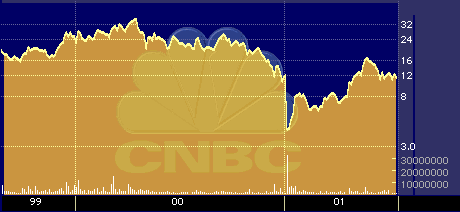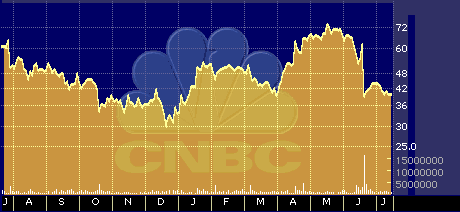
McAfee Jumps on First Trading Day
McAfee Jumps on First Trading Day
by Hal Plotkin
Silicon Valley Correspondent
New issue McAfee.com Corp. {MCAF} has moved up sharply in its trading debut, opening at 22, after pricing its 6.25 million share offering late Wednesday at $12, at the high end of its expected $10 to $12 range.

McAfee.com intraday stock performance
“McAfee is in a good area that is the wave of the future for how small businesses and consumers will protect and maintain their PCs,” says Matt Barzowskas, vice president of FAC/Equities, an investment-banking firm based in Boston.
McAfee.com, which offers online anti-virus and computer-maintenance services, was formally incorporated as a wholly owned subsidiary of Santa Clara, Calif.-based Network Associates Inc. {NETA} in 1998, six years after the firm began using the McAfee.com brand name to market PC security and management software.

Network Associates Two-Year Chart
The IPO leaves Network Associates in control of 95 percent of McAfee.com’s voting shares.
“Network Associates is taking advantage of the outrageous dot-com valuations,” says Richard Williams, an analyst at Jefferies & Co., based in New York. “It’s cheap financing.”
Nonetheless, Williams, like Barzowskas, says McAfee.com looks like a winner. “McAfee.com should perform well,” he says. “The McAfee brand name has strong drawing power with the installed base of PC owners.”
PC owners, particularly PC owners with Internet connections, are the target market for McAfee.com’s PC-protection services. An estimated 63 million U.S. households will be online by 2002, representing 59 percent of all U.S. households, according to Jupiter Communications, based in New York.
Last year, consumers purchased $1.01 billion worth of products designed to detect and destroy computer viruses. The anti-virus market is projected to grow to $2.9 billion by 2003, up from $1.5 billion this year, according to International Data Corp., based in Framingham, Mass.
In 1998, McAfee.com’s parent company, Network Associates, controlled 44 percent of the anti-virus market. The closest competitor, Cupertino, Calif.-based Symantec Corp. {SYMC}, maker of the Norton anti-virus products, controlled 24.5 percent, according to IDC.

SYMC 52-week chart
Late last month, Symantec announced record second-quarter revenue of $182.5 million, an increase of 40 percent over the same quarter last year. Like McAfee.com, Symantec has been emphasizing Web-based anti-virus and computer maintenance services in recent months, as opposed to stand-alone shrink-wrapped products sold through retail outlets.
Chris Christiansen, an analyst at IDC, says the transition now under way from shrink-wrapped anti-virus software products to subscription-based services sold over the Internet by companies such as McAfee.com is part of the evolving application service provider business model that’s taking hold in the high-tech industry.
“Virtually everyone is getting into that market right now,” he says. “It’s where everyone feels they need to be.”
Christiansen says that model, which allows users to purchase software online and download updates on an as-needed basis, is particularly suited to the anti-virus market.
IPO Pipeline: Immersion Set for This Week
Expedia IPO Takes Off Strongly
“It eliminates inventory management and there are no [sales] channel management issues,” he says. “You’re not changing [computer] bits to atoms and then changing them back to bits again. It’s a much more efficient way to go.”
As for McAfee.com? “It’s a dot-com stock; that can’t hurt,” he says.
One of the interesting side stories to the McAfee.com IPO is what the offering might do, over the long term, to the stock of parent company, Network Associates. That stock took quite a hit last April as a result of what analysts call “channel inventory issues.”
Decoded, that means Network Associate was having a tougher-than-expected time selling its wares. The firm was particularly embarrassed by customer complaints that one of its products, a software suite designed to solve a variety of computer problems, actually caused problems of its own, including computer crashes, for many consumers who installed the software.
Williams says Network Associates has put those problems behind it. On Oct. 18, Williams upgraded the stock to “buy,” setting a 12-to-18 month price target of $30. “The McAfee.com IPO broadens the reach of Network Associates,” he says. “The company [Network Associates] is in the midst of a renaissance. I think you’re going to see their stock get up and go.”
Paul Saunders, a research analyst at Soundview Financial Corp., based in Stamford, Conn., also has a “buy” rating on Network Associates’ stock, though with a price target in the mid-20s. “It’s one of the cheaper stocks in my universe,” he says. “But Network Associates is arguably a dominant vendor in the general-information security market.”
Saunders says he expects strong growth in that overall market, which extends past anti-virus concerns to a much larger set of network security and maintenance issues.
He’s also optimistic about McAfee.com’s stock.
“It’s a Morgan Stanley, Hambrecht & Quist, Robbie Stephens deal,” he says. “I can’t imagine they can’t put together a strong investment story. I don’t think it’s going to be another Sycamore or Akamai, but it should trade up.”
McAfee.com posted a loss of $21.8 million on revenue of $16.1 million for the nine months ended Sept. 30, compared with a loss of $823,000 on revenue of $4.2 million for the same period last year.


